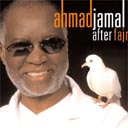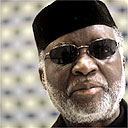There were plenty of people about whom Miles Davis didn't have a good word to say. And there were a few who would have needed psychiatric help if they had heard what he had to say about them. But the dark prince of the jazz trumpet nearly glowed with praise when it came to Ahmad Jamal.
A dapper, decisive-looking man who nowadays resembles an African UN delegate rather than a jazz pianist, Jamal has mostly seemed to the public like a man on the jazz margins for four decades. But his influence on fellow jazz musicians has been subtle and substantial. Davis was the most high-profile of his admirers, but many others are close behind, including Diana Krall.
At 72, his playing is still as peremptory as drumming, as clear and quick as flowing water. And he sounds like no other jazz pianist in action today, even in an era that has seen a rejuvenation of the acoustic piano trio in the hands of young performers as varied as the classical Brad Mehldau and the funky Esbjorn Svensson. Last year, Jamal had the critics rushing to pin stars on A L'Olympia, the live recording of his 70th birthday Paris show. The pianist's concert discs have usually represented him better than his studio work, but this studio recording, from New York last summer, is very nearly as good as its predecessor.
Jamal's musical references run wide, reflecting the strange trajectory of his career. Most of the tracks on In Search Of are glimpses into other eras as much as they are windows into Jamal's own impetuous and witty intelligence. His powerful chemistry of romantic angst and virtuosic urbanity brought him chart hits with an early smooth-jazz public in the 1950s; then there was a pragmatic preference for nightclub proprietorship over playing, doldrums years in the 1970s and 1980s, and an astonishing renaissance over the past decade in which he has erupted again like a long-dormant volcano.
Jamal is currently playing so well that he not only sounds like a performer with the energies of a 27- rather than a 72-year-old, but his unique background and wealth of experience makes him sound like a dozen pianists of quite different instincts and methods all rolled into one. He has put it all down to being raised in Pittsburgh: "I was delivering papers to Billy Strayhorn's family when I was seven years old. It was Mary Lou Williams's town, Kenny Clarke's, Art Blakey's, Earl Hines's, Roy Eldridge's, George Benson's, Stanley Turrentine's, Earle Wilde, the exponent of Liszt, Maxine Sullivan, Loren Mazel the conductor." As a student pianist, he investigated everything: "Mozart along with Art Tatum." Listening to In Search Of, that's just the way you would assume it would have been.
The set features the L'Olympia band (minus the saxophonist George Coleman), with James Cammack on double bass and Idris Muhammad on drums. The title track is the opener, and could hardly be a more succinct travelogue of Jamal's journey from the pre-bop era and the pearly good-humour of 1930s keyboard giant Errol Garner to the structural intricacies of more recent jazz, and even some of the abstractions of the free scene.
In Search Of is a sequence of chords that keeps skidding off into fast swing over Idris Muhammad's restless cymbal and snare and James Cammack's elastic walking lines. Jamal often repeats the punchy, blockish theme, quietens it down to a whisper, briefly illuminates the counter-melody, recaps the opening with explosive chords, and idly taps one note while everyone else stops, toying with the listener's expectations as to when they'll all race off again like greyhounds out of the traps. The piece is a typical instance of the sensibility that so attracted Miles Davis - who, like Jamal, sought vehicles for improvisation that freely moved by changes of mood, dynamics and density, rather than obeyed the rigid dictates of the song structures.
There's also a relaxed, dandyish side to Jamal too, audible in the waltz Should I (which has a few echoes of My Favourite Things to it). But the percussive chord-battering, Monkish silences and tidal flows the length of the keyboard still surface in it. The bouncy calypso Island Fever suggests Don't Stop the Carnival is just around the next palm-tree, but the rumbling piano runs almost blur into the dense dissonances of Cecil Taylor. Jamal throws Freddie Hubbard's Little Sunflower into an alternately tender and heated account of I've Never Been in Love Before, and his roots in 1930s swing are evident all over the ecstatic chordwork and mischievous phrasing of Where Are You?
By this stage in the set, non-devotees might find that the leader's unquenchable appetite for imperious chord-banging - like somebody unable to make a speech without thumping on a table - can try the nerves a little. But as part of the general picture of this unique artist's sweeping grasp of 20th century music and its antecedents, it is engagingly representative of his still-boundless energy. Even the gleaming, wide-screen smile of the 1939 Latin-dance hit Perfidia (covered years later by the Ventures, Linda Ronstadt and many others) can't maintain its untroubled feelgood factor when Ahmad Jamal gets his hands on it - cavalierly altering the tempo, hammering the chords, sneaking up to the tune as if ringing its bell, then scuttling off around the corner. As Jamal once said: "If the others go right, I go left. I do things differently."







